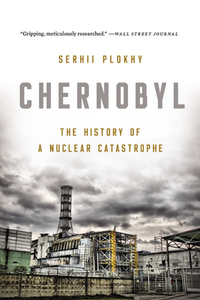Take a photo of a barcode or cover
dark
informative
slow-paced
informative
reflective
medium-paced
The book has a compelling narrative that weaves quotes from "Voices from Chernobyl" and primary sources expertly. Serhii Plokhy is a superb narrator. This is the first book I have read on the subject that could truly be called a comprehensive history of the disaster. However, this book would be more appropriately titled "Chernobyl: A Political History." While the first 3/4 of the book addresses the Chernobyl disaster directly, the last four or five chapters take a hard left turn into Ukrainian politics and Chernobyl's effect on them. He also makes some factual errors, one of which I chronicle in my review. The greatest flaw is what truly seals this book as deserving of three-stars, however. Throughout the book, Mr. Plokhy makes a concerted effort to paint nuclear energy as dangerous. This is the real underlying narrative of the book, and I found it both misleading and ill-founded.
Before I continue, let me be clear: the last section is very interesting, but it is not immediately relevant to a "History of a Nuclear Catastrophe." It catalogs how the Chernobyl disaster, and the anti-nuclear sentiment that followed it, set the dissolution of the USSR into high gear. He makes some truly compelling points, but it feels disconnected from the rest of the book.
Mr. Plokhy also makes a mistake typical of Chernobyl historians: he declares the three divers-who emptied the Chernobyl reactor water tanks to prevent another steam explosion-as having died in the weeks after the accident. This is incorrect. Two of the three divers-Valeri Bezpalov and Alexei Ananenko-are alive today, and Alexei continues to work in the nuclear energy industry. The third diver, Boris Baranov, died in 2005 from heart failure. For more information, read "Chernobyl 01:23:40" by Andrew Leatherbarrow.
These first two critiques are somewhat minor and could be forgiven, but Mr. Plokhy's anti-nuclear purpose behind the book is in poor taste. He spends of good deal of time explaining how the Chernobyl reactor only exploded because it was poorly designed and poorly managed, but he does not extend this reasoning to his criticism of nuclear power. The RMBK reactors that the USSR operated were graphite-moderated and did not have concrete containment lids to prevent the exact type of disaster that happened at Chernobyl. The pressurized water reactors that the United States and other nations use are far more safe than those of the RMBK design.
Mr. Plokhy is a wonderful story-teller, but his book exceeds its mandate and strays into political topics that catch the reader by surprise. Overall, I would recommend this book to friends, but I would caution against the author's underlying intentions.
Before I continue, let me be clear: the last section is very interesting, but it is not immediately relevant to a "History of a Nuclear Catastrophe." It catalogs how the Chernobyl disaster, and the anti-nuclear sentiment that followed it, set the dissolution of the USSR into high gear. He makes some truly compelling points, but it feels disconnected from the rest of the book.
Mr. Plokhy also makes a mistake typical of Chernobyl historians: he declares the three divers-who emptied the Chernobyl reactor water tanks to prevent another steam explosion-as having died in the weeks after the accident. This is incorrect. Two of the three divers-Valeri Bezpalov and Alexei Ananenko-are alive today, and Alexei continues to work in the nuclear energy industry. The third diver, Boris Baranov, died in 2005 from heart failure. For more information, read "Chernobyl 01:23:40" by Andrew Leatherbarrow.
These first two critiques are somewhat minor and could be forgiven, but Mr. Plokhy's anti-nuclear purpose behind the book is in poor taste. He spends of good deal of time explaining how the Chernobyl reactor only exploded because it was poorly designed and poorly managed, but he does not extend this reasoning to his criticism of nuclear power. The RMBK reactors that the USSR operated were graphite-moderated and did not have concrete containment lids to prevent the exact type of disaster that happened at Chernobyl. The pressurized water reactors that the United States and other nations use are far more safe than those of the RMBK design.
Mr. Plokhy is a wonderful story-teller, but his book exceeds its mandate and strays into political topics that catch the reader by surprise. Overall, I would recommend this book to friends, but I would caution against the author's underlying intentions.
"But I felt nonetheless that a new age had dawned. And when the train pulled in, it seemed to me so different, as if it had just come from the old, clean world we used to know, into our new poisoned age, the age of Chernobyl."
Plokhy provides a thoroughly researched account of the 1986 explosion of Chernobyl's Unit 4, a disaster rooted in systemic failures within the Soviet administration. The event serves as a stark reminder of the dangers posed by human hubris and overconfidence. "Chernobyl – History of a Tragedy" delves deeply into the interplay of political pressures, technical deficiencies, and human error, all culminating in a catastrophe with far-reaching global consequences. Although my primary interest was in the technical aspects of the accident and its environmental and humanitarian toll, Plokhy excellently relates the political and social consequences that unfolded in the years following April 1986. Ultimately, Plokhy's work not only illuminates the multifaceted nature of the Chernobyl disaster but also serves as a powerful reflection on the enduring impact of institutional failures and the lessons we must learn to prevent such a tragedy from repeating itself.
"For atomic nails have been driven into his hands / For his lips are burning with hellish pain."
Plokhy provides a thoroughly researched account of the 1986 explosion of Chernobyl's Unit 4, a disaster rooted in systemic failures within the Soviet administration. The event serves as a stark reminder of the dangers posed by human hubris and overconfidence. "Chernobyl – History of a Tragedy" delves deeply into the interplay of political pressures, technical deficiencies, and human error, all culminating in a catastrophe with far-reaching global consequences. Although my primary interest was in the technical aspects of the accident and its environmental and humanitarian toll, Plokhy excellently relates the political and social consequences that unfolded in the years following April 1986. Ultimately, Plokhy's work not only illuminates the multifaceted nature of the Chernobyl disaster but also serves as a powerful reflection on the enduring impact of institutional failures and the lessons we must learn to prevent such a tragedy from repeating itself.
"For atomic nails have been driven into his hands / For his lips are burning with hellish pain."
dark
informative
tense
medium-paced
emotional
informative
sad
medium-paced
challenging
informative
reflective
medium-paced
informative
reflective
slow-paced
dark
informative
reflective
sad
medium-paced
challenging
dark
emotional
sad
tense
slow-paced






